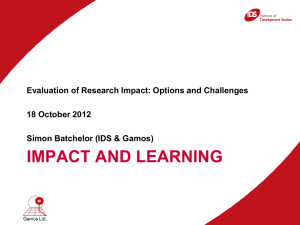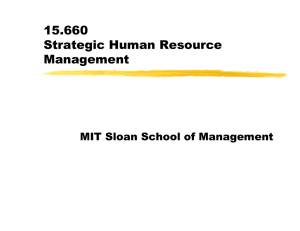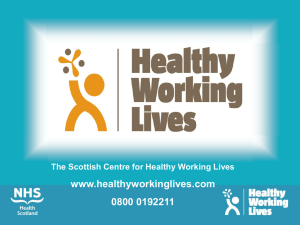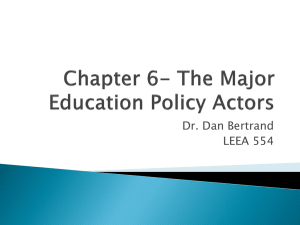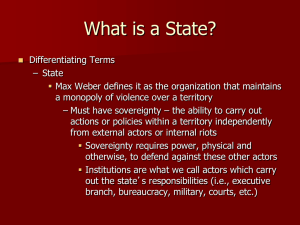Industry Use of Evidence to Influence Alcohol Policy: A Case Study
advertisement
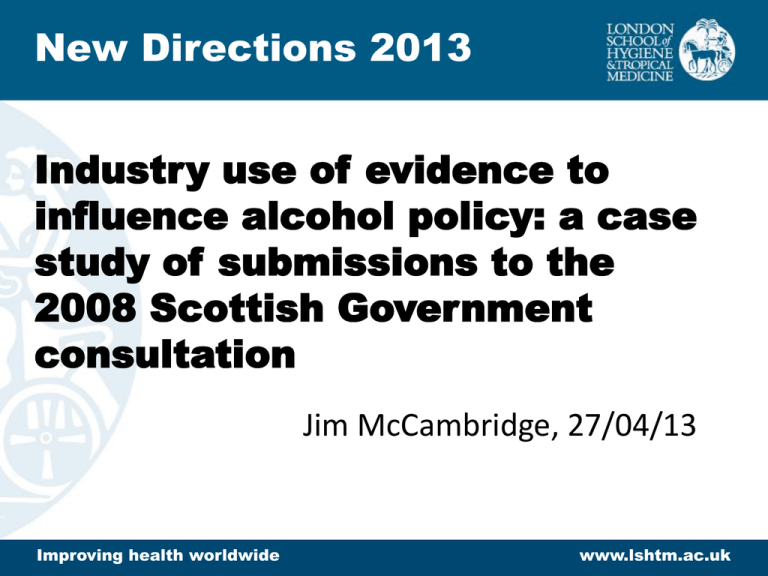
New Directions 2013 Industry use of evidence to influence alcohol policy: a case study of submissions to the 2008 Scottish Government consultation Jim McCambridge, 27/04/13 Improving health worldwide www.lshtm.ac.uk Background • There is a broad consensus in the international research literature that measures to raise the price of alcohol and control its availability, along with restrictions on marketing activities are the most effective measures • Industry actors oppose these and have been strongly criticised for producing incomplete and distorted views of the evidence • Not clear how evidence is used to influence policy Case study • 2008 consultation on ‘Changing Scotland’s relationship with alcohol’ • First governmental publication within the U.K. to adopt a whole population approach to alcohol policy, including measures to introduce minimum unit pricing • Produced by Scottish National Party (SNP) minority government in 2007 • 27 documentary submissions analysed & compared with Alcohol: No ordinary Commodity by Babor et al. Rhetorical commitments to policy goals and evidence-based policy Portman Group: • “the Scottish Government has both a duty and a right to help protect society against the adverse consequences of alcohol misuse, provided that it does this on the basis of the best available evidence and uses policy measures that are based as far as possible, on broad consensus within society...We believe in evidence-based policy making” • WSTA definition/reframing nature of the problem: • “to tackle the minority with alcohol problems – the drinkers rather than the drink” and “policies which punish all drinkers for the misconduct of a few” [would be unfair] Misrepresentation of strong evidence • “such an approach has been widely discredited in research studies’’ [Portman Group, citing Geoffrey Rose] • “There is a raft of contradictory evidence of the influence of price and promotions on harm” [Portman Group, no refs] • ‘‘The consultation makes many claims regarding the impact of price on consumption. Yet there is little in the way of evidence’’ [more than 100 studies] • “the overwhelming consensus of academic studies in this area concludes that it does not drive overall increases in category consumption in the total population” [SBPA, cp Babor et al.] Promotion of weak evidence • Morrisons provide data on alcohol consumption at home, having reduced by 31% whilst consumption in other locations has increased by 14% in the 3 year period 2005-08 • ASDA present data which appears to show that under-age drinkers are half as likely to try to obtain alcohol from a large supermarket (39%) as they would from their parents (86%), an off-licence (78%) or a small convenience store (92%) • Diageo use being “more likely to consider drinking responsibly following the adverts” as intervention outcome measure • St. Neots community partnership evaluation Unsubstantiated claims about unintended effects • ASDA: ‘‘Believe that minimum pricing and a promotions ban will create incentives for the blackmarket and criminals and illegal door to door sales’’ • Sainsbury’s: Describe possible routes for cross-border shopping in England and Northern Ireland • Portman Group: ‘‘Adopting a population-wide approach may not only fail to reduce misuse but it could perversely contribute to an increase in unhealthy drinking patterns and unregulated trading with the associated criminal activities” • SBPA: ‘‘May undermine the targeted initiatives, which may yield the highest results [sic] amongst the groups most heavily misusing alcohol’’ Advocacy of preferences without evidence • Tesco: ‘‘We consider that the Scottish Government’s laudable objectives can best be achieved through a triple strategy of stricter enforcement of existing law, better education and effective partnership between those who sell alcohol, government, local authorities and enforcement authorities” • ASDA: ‘‘We would urge policy-makers to concentrate on a combination of education, information and working with the on and off-trade to test out a wider range of voluntary measures to combat irresponsible drinking. Also, there is an urgent need to ensure that there is maximum enforcement of existing legislation’’ Interpretation 1 • “industry actors ignored, misrepresented and otherwise sought to undermine the content of the international evidence-base on effective policies in order to influence policy... These tactics make evidence-based policy making more difficult to achieve where industry actors are involved” • “A crucial limitation of studies of documents designed for the public domain, is that they tell us little about the less visible means of industry influences on policy, nor about the success of these efforts” Interpretation 2 • “The construction of doubt about the content of scientific evidence [across many fields]... may underlie the approach taken in these submissions” • “A crucial limitation of studies of documents designed for the public domain, is that they tell us little about the less visible means of industry influences on policy, nor about the success of these efforts” Interpretation 3 • “In Westminster, alcohol industry actors have cultivated long term relationships with the main political parties and an apparent consensus amongst these parties that they should have a wide-ranging role in alcohol policies” • “The potential for corporations with vested interests to interfere with the evaluation of scientific evidence by policy makers needs to be restricted for effective policies to be designed.” • “Commercial conflicts of interest should be made explicit and policy makers should treat industry actors’ interpretation of research evidence with extreme caution” Cp tobacco industry • Bero: These include attempts to deceive the public and policy makers by hiding information held by companies and claiming that advertising and marketing are aimed only at persuading existing smokers to switch brands rather than also attracting new users • Co-ownership – SAB-Miller & Phillip Morris (Daube) • Health harms pose similar strategic problems

